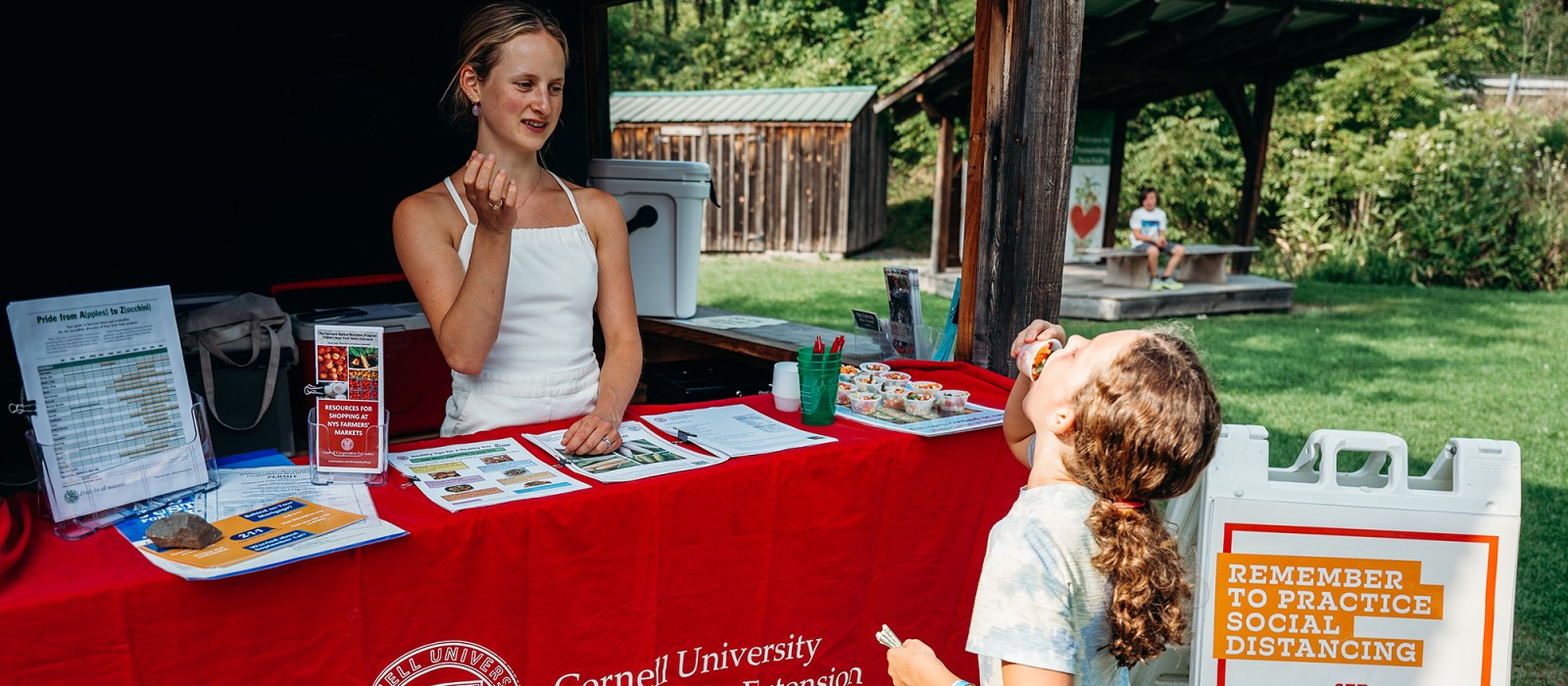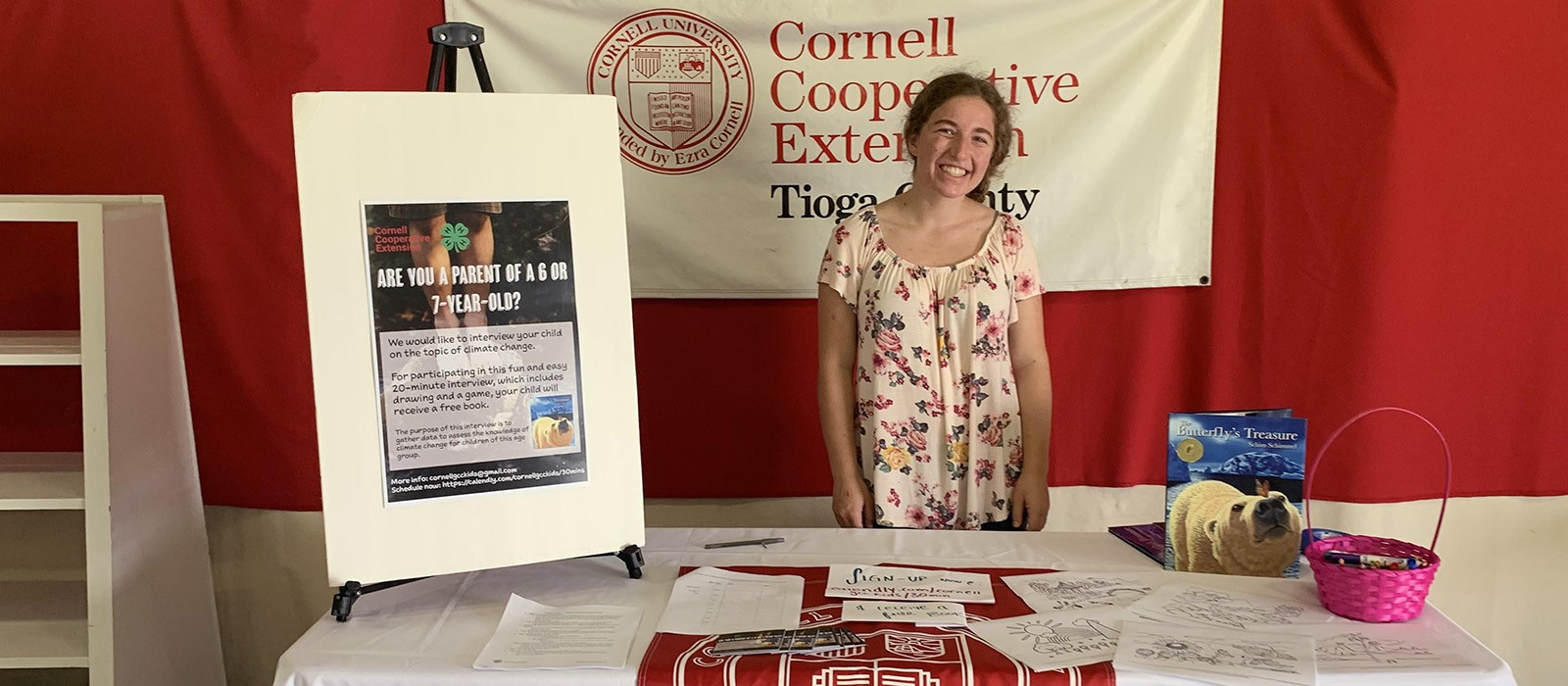
Ainsley Fleming-Wood ’23, a Nutritional Sciences major, shared locally sourced peach tomato salsa with Trumansburg rising fifth grader Cora Anderson this past August at the Trumansburg Farmers' Market. (Photo: R.J. Anderson/Cornell University)
Last summer, a group of Human Ecology students had the opportunity to learn by doing, all while helping Cornell extend its impact in the wider New York State community through the Cornell Cooperative Extension (CCE) Summer Internship program. CCE, a collaboration between the College of Human Ecology and College of Agriculture and Life Sciences, is dedicated to integrating Cornell’s research into the larger New York State area, in accordance with the university’s mission as a land grant university.
In the CCE Summer Internship program, students collaborate with Cornell faculty and community leaders across the state on various projects to promote a healthier New York. Four students from Human Ecology participated in the program last summer: Ryan Greene ’23, Aliza Saunders '23, Roy Kim ’22, and Ainsley Fleming-Wood ’23. Their projects were closely related to their course of study and involved hands-on, varied activities that taught them how to apply what they’ve learned in the classroom out into the world.
Ryan Green ’23 - Fiber Science
Greene interned for the project “Understanding Effectiveness of Textiles as Virus Prevention Facemasks.” A fiber science major, his chosen project focused on communicating the effectiveness of masks to young audiences. He noted that the real-life applications drew him to apply to the program. Through the internship, he could take the knowledge gained in his classes and teach an audience about the importance of face masks. “The primary goal of Cornell Cooperative Extension is to disseminate knowledge from the university to the public. This intersected perfectly with what I wanted to do,” Greene explained.
Through the summer, Greene researched, designed, and developed textile education activities for audiences ranging from young children to adults. He later piloted one of those programs at two youth camps run by the Rockland Council on Alcoholism and Other Drug Dependence (RCADD) and evaluated the effectiveness of those sessions through feedback forms. “The main thing I gained from this project was the ability to convey information in a simple but comprehensive manner,” Greene explained.

Aliza Saunders presenting at the NY State Fair (photo: Provided)
Aliza Saunders '23 - Design and Environmental Analysis
Saunders, the intern for the “Children and Climate Change” project, shared a similar lesson about community engagement. After taking Environmental Psychology her first year at Cornell, Saunders joined Professor Gary Evan’s team to work on developing a report on children’s understanding and emotional response to climate change. Her internship was virtual, so every day she met online with partner organizations to conduct Zoom interviews with children, asking them questions and noting their answers. Saunders said it was incredibly valuable to build relationships with organizations outside Cornell.
“I learned how rewarding it is to work directly with community partners to help support a common goal,” she said.
Roy Kim ’22 – Global and Public Health Sciences
Kim applied for the project “4-H Sustainable Food Systems Resource Management” because he wanted to learn about Sustainable Food Systems and how they helped combat food insecurity in local communities. Over the summer, Kim was able to learn about all the systems already in place in the different 4-H programs throughout New York State and then draw conclusions about where they could be expanded. Kim noted that he learned about the diversity in food programs across the state.
“Although these programs were specialized for their respective counties, they all shared a commonality in engaging youth; to teach them where their food comes from, how their food is produced, and what happens to their food after it leaves their table,” he said.
Ainsley Fleming-Wood ’23 – Nutritional Sciences
“I learned so much about how farming works,” said Fleming-Wood of her internship in the Farmers Market Nutrition Program. The intern in the program works collaboratively with CCE Wayne County to design materials and collect data to give shoppers the best information about their nutritional needs. Fleming-Wood explained that she would start off her day going to the CCE Tompkins County kitchen to prepare a healthy recipe before taking it to the farmers’ market where she would set up a booth with recipes, food assistance information, healthy eating tips, and more. She would use those hours as an opportunity to talk to customers and other vendors and would report back her findings in a biweekly meeting with her supervisors.
Through her internship, Fleming-Wood said she cultivated valuable connections with farmers at the market, as well as with her project team. “I learned about how amazing it feels to have supervisors who want to hear your opinions and implement your ideas, and I learned a lot about the work environment I hope to be a part of in the future,” she said.
Fleming-Wood said she gained confidence throughout the summer as she learned how to work in a team and also contribute to a larger project by working on her own. “This summer gave me a mix of personal and professional development skills,” Fleming-Wood said. “I highly recommend pursuing an internship with CCE. This was truly the best summer of my life.”